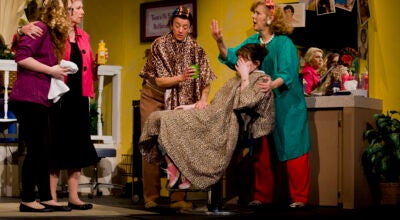Stanfield, Locust residents weigh in on Elm Street Project
Published 11:30 am Monday, May 6, 2019
As the Locust City Council continues its talks with developer Hopper Communities about a proposed new 200-plus home development on Elm Street, many people who live on or near the street have voiced their opposition.
During the March 15 city council meeting, where Hopper introduced the project to the public, 15 people spoke to the council. All of them opposed the project.
A Hopper representative said Locust has needed more homes because from 2010 to 2015, the population has grown 9.35 percent and has been growing 3 to 4 percent annually since 2015. As Charlotte continues to grow and push outward into the suburbs, city less than 50 miles away like Locust are beginning to feel the effects.
The development calls for 60-foot lots and would have a density of 2.17 units per acre for a total of 265 lots. Homes are projected to range in price from $200,000 to $250,000.
Recently, a Facebook page titled “Neighbors against Elm Street Project” was created. So far, 35 people have liked the page and several have commented about their opposition to the project.
Several people recently met with the The Stanly News & Press to talk about why they oppose the project.
Joe Evankovech lives on the Stanfield side of Elm Street. His property is at the Locust city line.
He opposes the development because he fears it would hurt the vibrant wildlife around the area.
Evankovech, who has lived on Elm Street for more than 20 years, has several streams and various wildlife around his property and he doesn’t want to see any of it tampered with.
Neighbor Tana Stroupe agrees.
“We have such a peaceful area,” she said. “I have plentiful deer and wild turkeys. I enjoy feeding and watching them.”
She is worried about Locust’s growth.
“It seems that Locust is continuously building and adding more developments,” she said. “If I wanted to live in a big city I would have moved to one.”
Patrick Dennis, who also lives on the Stanfield side of Elm Street, is worried the development would turn Locust into just another suburb of Charlotte, instead of the nice, rural escape from the big city many feel it is now.
Dennis grew up in a small rural town in Ohio that was eventually overtaken by “unchecked growth.” His family specifically moved to the Locust area to get away from the hustle and bustle of Charlotte, where his family previously lived.
Locust Elm Street resident Selena Turner says the development would hurt the wildlife and natural habitats in the area, crime would increase and it would affect the “already overcrowded school system.”
“This project will be a nightmare on Elm Street,” Turner wrote in an email to the SNAP, evoking the 1980s horror franchise. “I understand that there must be growth, but I also know that there is a time for preservation.”
Vincent Owens spoke out against the development at the March 15 city council meeting. He worried that with more housing coming to Locust, crime would increase.
As a parent, Kelli Coley, who also spoke at the March meeting, was most concerned that Locust Elementary School would not be able to handle the influx of children that would come with the development.
Other citizens, like Brad Harvell, who lives on Mockingbird Lane, worried the development would bring too much traffic to the area.
But others are in favor of the project.
Former city councilman Joe Bishop supports the development.
“I’m in favor of growth” in Locust, he said.
“Simply put, growth is coming to Locust whether we like it or not,” he said. “The best thing we can do is to try and manage it.”
“I believe the city would benefit from a sustainable project,” added Cesar Correa, city administrator. “The proposed quality of this project and the anticipated sale prices line up with the rising wages and home values in Locust. This allows the city to improve the quality of services that our current and future residents expect. Locust is an excellent community; it’s also a growing community. I believe that the proposed project will provide housing diversity in Locust, expand our demographics and help attract new businesses.”
Hopper Communities is scheduled to present a revised site plan to the city council during Thursday’s council meeting.
For all the people who want to see Locust remain a small, enclosed rural city, Bishop had a blunt response.
“A town that doesn’t grow dies,” he said.






